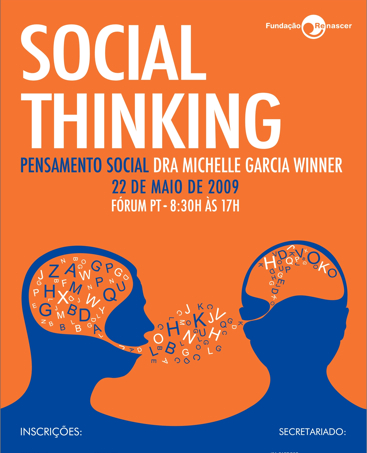Introduction to Social Thinking
By Michelle Garcia Winner, CCC-SLP
 Social thinking is what we do when we interact with people: we think about them. And how we think about people affects how we behave, which in turn affects how others respond to us, which in turn affects our own emotions.
Social thinking is what we do when we interact with people: we think about them. And how we think about people affects how we behave, which in turn affects how others respond to us, which in turn affects our own emotions.
Whether we are with friends, sending an email, in a classroom or at the grocery store, we take in the thoughts, emotions and intentions of the people we are interacting with.
Most of us have developed our communications sense from birth onwards, steadily observing and acquiring social information and learning how to respond to people. Because social thinking is an intuitive process, we usually take it for granted.
But for many individuals, this process is anything but natural. And this often has nothing to do with conventional measures of intelligence.
In fact, many people score high on IQ and standardized tests, yet do not intuitively learn the nuances of social communication and interaction.
While these challenges are commonly experienced by individuals with autism spectrum disorders (high-functioning), social communication disorder, Asperger’s, ADHD, nonverbal learning disability (NLD) and similar diagnoses, children and adults experiencing social learning difficulties often have received no diagnosis.
A treatment framework and curriculum developed by Michelle Garcia Winner targets improving individual social thinking abilities, regardless of diagnostic label. Professionals and parents alike are using these methods to build social thinking and related skills in students and adults. Social Thinking books, workshops and trainings, created by Winner or based on Winner’s work, now offer a range of strategies that address individual strengths and weaknesses in processing social information.
Research is beginning to support the effectiveness of teaching Social Thinking. The Journal of Autism and Developmental Disorders published a report on methodologies specifically addressing deficits in the social thinking process, finding that they are successful at teaching the ability to interact socially in people with social limitations who have near-normal to way above-normal intelligence.